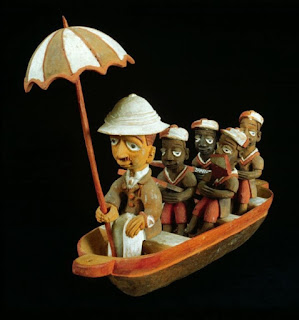 |
| British stamps used at Akassa, Nigeria. HMSO (image is in the Public Domain). |
 |
| The war canoe of King Koko of the Nembe, an antagonist of the Royal Niger Company in the 1890s. Daily Graphic (image is in the Public Domain). |
The British administered its Nigerian territories (a Northern and a Southern Province, together with the "Lagos Colony") via a system of "indirect rule," with a relatively small number of English Residents" and District Officers, supported by a native elite of regional and village chiefs (Emirs in the Northern Province), who were granted educational and financial privileges in return for their loyalty.
 |
| Yoruba sculpture, satirising "indirect rule." Image: Tropenmuseum (licensed under CCA). |
In contrast to many other colonies, including Kenya, Nigeria did not undergo a long and violent struggle for independence. Realising that the World had changed since the end of the Second World War, and that Nigeria, specifically, was unlikely to be susceptible to the influence of Soviet or Chinese Communism, the British authorities negotiated what was intended to be a smooth transition to independence and democracy. The only problem was that "Nigeria," as a geographical or political concept, meant little to most of the people who lived there. Loyalties operated on a far more local basis, and, when elections were held, most people voted for members of the same tribal elites that had held power under the British.
 |
| Linguistic map of Nigeria. Image: Hel-Hama (licensed under CCA). |
A federal republic was proclaimed in 1963, but, in the elections that followed, different parties emerged to represent the predominantly Muslim Hausa and Fulani people of the north; the Yoruba people of the south-west; and the Igbo people of the south-east. Smaller parties were pushed aside, amid widespread complaints of corruption and intimidation, and those who had been elected by communities with very different priorities struggled to find common cause with one another.
The Nigerian military staged a coup in 1966, which was followed by a bloody civil war. A second republic, proclaimed in 1979, lasted only for four years; a third lasted for just a few months in 1993; and the fourth, declared in 1998, following the death of the military leader, General Sani Abacha, continues to this day, but has faced significant challenges throughout its nineteen years of existence.
 |
| The Nigerian Civil War (image is in the Public Domain). |
 |
| Election in Nigeria, US Agency for International Development (image is in the Public Domain). |
Chinua Achebe's novel, A Man of the People, published just weeks before the 1966 coup, is set in a fictional rural district of an unnamed African country, but it feels very like the Igboland in which its author grew up. An educated, idealistic and naive young man, Odili Samalu, is teaching in a village school, when it receives a visit from the Minister of Culture, his own former teacher, Chief the Honourable M.A. Nanga MP. Nanga takes an interest in Odili, and invites him to his home. A bright future n public service seems in store for Odili, but he soon learns the true price of patronage, and when, with a group of friends, he decides to challenge Nanga for his parliamentary seat, he not only discovers the corrupt and brutal underside of the politics of his country, but is also forced to confront his own motivations, and to ask whether he, himself, has not been compromised by the system that he set out to change.
"No one can deny that Chief the Honourable M A Nanga, MP, was the most approachable politician in the country. Whether you asked in the city or in his home village, Anata, they would tell you he was a man of the people. I have to admit this from the outset or else the story I'm going to tell will make no sense."
"My father was a District Interpreter. In those days when no one understood as much as 'come' in the white man's language, the District Officer was like the Supreme Deity, and the interpreter the principal minor god who carried prayers and sacrifice to him. Every sensible supplicant knew that the lesser god must first be wooed and put in a sweet frame of mind before he could undertake to intercede with the Owner of the Sky. So interpreters in those days were powerful, very rich, widely known and hated. Wherever the DO's power was felt - and that meant everywhere - the Interpreter's name was held in fear and trembling."
"The appearance of comparative peace which Max's house presented to me that morning proved quite deceptive. Or perhaps some of Chief Nanga's 'queen bee' characteristics had rubbed off on me and transformed me into an independent little nucleus of activity which I had trailed with me into this new place. That first night I not only heard of a new political party about to be born but got myself enrolled as a foundation member. Max and some of his friends having watched with deepening disillusion the use to which our hard-won freedom was being put by corrupt, mediocre politicians had decided to come together and launch the Common People's Convention."
Mark Patton is a published author of historical fiction and non-fiction, whose books can be purchased from Amazon.


No comments:
Post a Comment